Is it OK to Take a Break from Baby-Led Weaning?
In this episode we're talking about:
- Why it's not ideal to offer new allergenic foods when your baby is sick
- How long the teething process takes…it's not a good reason to stop new foods
- When you're out and about or traveling with your baby how you can still try new foods
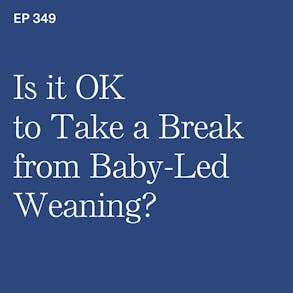
LISTEN TO THIS EPISODE
Episode Description
What if you started solid foods but you’re thinking about taking a break. Maybe your baby is sick, or you’re planning to travel, or your baby is teething and you’re just not feeling up to the challenge. Is it ok to take a break from starting solid foods if you’re doing baby-led weaning? In this episode we’re exploring reasons why you would want to pause with trying out new foods as well as other scenarios where it’s best to keep going.
Links from this Episode
- Baby-Led Weaning with Katie Ferraro program with the 100 First Foods™ Daily Meal Plan, join here: https://babyledweaning.co/program
- Baby-Led Weaning for Beginners free online workshop with 100 First Foods™ list to all attendees, register here: https://babyledweaning.co/baby-led-weaning-for-beginners
Other episodes related to this topic:
- Episode 58: What do I do if My Baby Has an Allergic Reaction? with Ron Sunog, MD https://blwpodcast.com/episodes/58
- Episode 213: BLW Teething Tweaks: What Changes Do I Make When My Baby is Teething? https://blwpodcast.com/episodes/213
- Episode 227: When Does the Food Allergy Prevention Window Close? with @allergykidsdoc David Stukus, MD https://blwpodcast.com/episodes/227

Latest Episodes
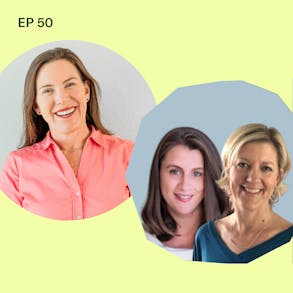
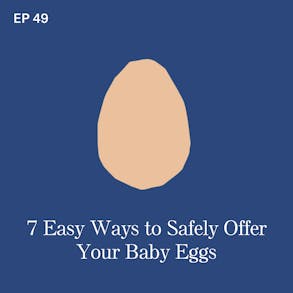

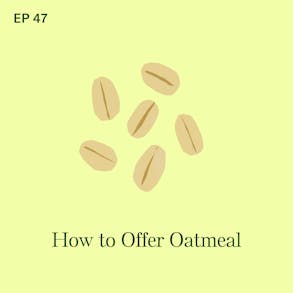
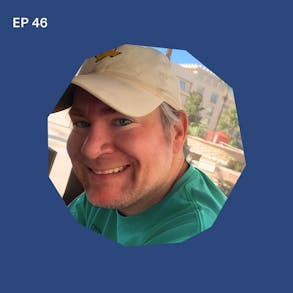
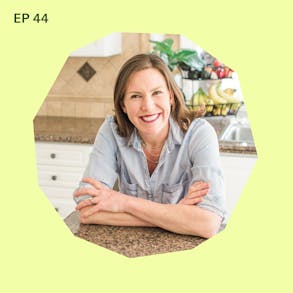
Puffworks (31s):
How are you doing with the introduction of Allergenic foods for your baby? I know it can feel like one more thing to do on your never-ending to-do list, but early introduction of allergenic foods can help reduce the risk of food Allergy down the road. If you're not sure where to start, peanut is a good one. Puff works baby peanut puffs are a low mess. No stress way to safely introduce peanut protein to your baby. I love the Puff Works, baby peanut puffs cuz they are the softest puff on the market. They dissolve really easily in your baby's mouth. You can do these early on in baby-led weaning plus Puff Works. Baby puffs have no added sugar, just a smidge of salt for preservatives and they're the perfect size for baby-led weaning. And I just checked that the Puff Works, baby peanut puffs are back in stock right now at https://puffworks.com and my affiliate discount code BABYLED works for 15% off. If you wanna grab a case while you're there? Be sure to check out the Puff Works baby Almond Puffs. That's an easy way to introduce your baby to a separate allergenic food category, which is tree nut. And that code BABYLED works for 15% off on baby almond puffs too. It's all online at https://puffworks.com
Katie Ferraro (1m 32s):
And there's lots of reasons why you might, you know, want to take a pause in starting Solid Foods. Maybe the baby got sick or they had an Allergic reaction to a different food or you're going on vacation or a trip. But when parents come at me with like, oh my baby's teething so we're just gonna take a pause, it's like, sorry, I'm gonna come right out and say it. Teething is a three-year process, okay? You don't just get to stop introducing Solid Foods cuz your baby's cutting a tooth. Hey there, I'm Katie Ferraro, Registered dietitian, college nutrition professor, and mom of seven specializing in baby-led weaning here on the Baby Led Weaning Made Easy podcast. I help you strip out all of the noise and nonsense about feeding, leading you with the confidence and knowledge you need to give your baby a safe start to Solid foods using baby-led weaning.
Katie Ferraro (2m 23s):
Let's say you started Solid Foods with your baby and you did some simple starter foods and your baby was into it or wasn't into it, but a few days or weeks after you guys started Solid Foods, you hit a roadblock. And that could be something like maybe the baby was sick or you decided to go on vacation or take a trip, or maybe your baby started teething or they're having constipation and now you're wondering, is it okay to take a break from starting Solid Foods? In this episode, I'm just gonna spitball a few scenarios that may arise after you start Solid Foods where you might consider pausing with the continuation of trying new foods, and then what can you do if this happens to you?
Katie Ferraro (3m 5s):
So is it okay to take a break from baby-led weaning? Absolutely. Parents ask me questions sometimes like Katie, have I done irreparable damage to my baby by insert scenario? Just as an aside, a lot of times that is like my mother-in-law gave the baby a bite of frosting your cake. Is the baby forever damaged? And the answer is no. You guys, one meal, one food one day is not a reflection of the overall scenario with how you're doing for starting solid foods, right? Okay. We have to be realistic here that things come up and stuff doesn't always look perfect and there's no perfect or right way to start solid foods.
Katie Ferraro (3m 46s):
So before we begin this conversation, I just wanna point out that there is no right or wrong way to do this, but we do see, based on the experiences of many of our friends and our colleagues, and in my case, these are my clients that I'm working with, what are the things that are gonna happen and how are you gonna be prepared to deal with them so that we can keep your baby on the trajectory? So let's zoom out first and look at what the big picture is here. When your baby starts Solid foods at six months of age, all of their nutrition is coming from infant milk. That's breast milk or formula, right? A hundred percent of it. And then by the time your baby turns 12 months of age, most of their nutrition can be coming from food, okay? And just a little bit of it will then come from milk.
Katie Ferraro (4m 27s):
So you have a six-month runway here to help get your baby up to speed so that most of their nutrition is coming from food by the time they turn one again, six months. Like, think about all the stuff your baby has already done in the first six months of their life. Okay? So If, you have a bad day or you have a bad week. Remember you get a six-month practice period here to get your baby to that finish line. So what is a scenario when you might wanna take a break from baby Led Weaning? Let's start first by talking about illness. There are some Babies who are never sick. There are some Babies who are always sick. There are some Babies who are really, really sick with life-threatening medical conditions and they're still starting Solid foods. There are some Babies who have a run-of-the-mill cold and the parents are like, you know what, we're just gonna work through this.
Katie Ferraro (5m 10s):
So again, you know your baby best. My suggestion is if your baby is sick, I advise against the introduction of any new potentially allergenic foods when the baby is ill. And I'll give you an example with one of my quadruplets Dylan. We had been at a Super Bowl party, so the Babies had just turned one, but they were premature. So like they're maybe like 10 and a half months adjusted age. And at the party there was ceviche. So ceviche contained both fish and shellfish, two separate potentially allergenic food categories that my Babies had had numerous times. And yet at this particular party, one of the Babies Dylan after the party and he had been pretty sick, he had had like a really bad cold with a ton of drainage.
Katie Ferraro (5m 53s):
He's one of those really weird kids. He doesn't like drain out his nose. He drains puss into his ears and sometimes out of his eyes. It freaked me out so bad the first time I saw it and the doctor's like, nah, your kids drain differently. I was like, okay, If, you say. So anyway, the draining kid had the ceviche, as did all of the other Babies and he developed hives all over his face and neck. And I remember putting him to bed being like, whoa, dude, that's weird. But like this child had had shellfish and fish numerous times. And I was like, you know what though? Like is this really an allergic reaction? There were no other signs of Allergic reaction, right? And if a baby has hives or rash or skin involvement, that goes away on its own and the child is not like bothered by it. They're not swelling, there's not vomiting, diarrhea marked change in demeanor. None of the other signs of allergic reaction, I really wasn't freaking out.
Katie Ferraro (6m 34s):
I did take pictures of it. I did call his doctor, but his doctor was like, is the baby sick? And I was like, yeah, he's got tons of pus in his ear. He's like, yeah, your baby has a compromised immune system. They're gonna be at greater likelihood for a reaction. So I waited until his cold cleared and I gave him the same exact foods again just to make sure he didn't have an Allergic reaction. He was totally fine. Of course that same kid, he's so smart, he's doesn't know. He always reminds me when whenever we have ceviche, like remember when I was Allergic to this, I was like, you're not Allergic to it. You had a reaction when you were sick. The takeaway message is when your baby's immune system is already compromised, don't make things harder by introducing an allergenic food for the first time. And if the baby does have a reaction, you're gonna be confused. Like is that really an Allergic reaction or is it just the fact that the baby already has a compromised immune system and they're reacting to a food that they might not otherwise?
Katie Ferraro (7m 19s):
And I'm not saying that you're gonna make your baby have an Allergic reaction. That's not what's happening here. You just might be confused as to what's happening. If, you offer the allergenic foods for the first time when your baby already has some sort of under other underlying illness. Now when your baby is ill, you know, they may want to nurse more or take the bottle more than food and that's, that's totally fine. You might not feel up to trying new foods, but I would encourage you to continue with the familiar foods, okay? And my suggestion to you is when you start Solid foods, try not to skip a day. It's not the end of the world If, you do it, but set your goals and your intentions that we're going to do new foods or we're going to eat Solid food every day. But when the baby's sick, If, you wanna pause on the new foods.
Katie Ferraro (8m 0s):
Cuz a lot of times that's a lot of extra work for you. If you're not up for it, it's totally fine. Now also keep in mind that if your baby has profuse vomiting or diarrhea, there is increased risk for dehydration. Okay? And so we wanna keep an eye on that. Babies lose the volume of fluid in their bodies as a percentage of their body weight much more rapidly than adults do. Okay? So sometimes your baby is sick, like they have a little bit of a cold. That's different than if they are having profuse vomiting or diarrhea because the risk for dehydration occurs so quickly in Babies. We really wanna be on high alert for those Babies. And in that case, you're probably gonna need to seek medical intervention, be doing some sort of an oral rehydration protocol with your provider.
Katie Ferraro (8m 42s):
Again, that's not gonna happen. Most of the time when you're baby's sick, they got a little cold and you don't feel like doing new foods, that's fine. But If, you can continue doing one new food a day. That's great. If, you can't at least offer Solid foods six to seven months. We try to do foods one to two times a day, eight to nine months, bump that up to two to three times a day at 10 months of age, ideally perfect world, we'd love to see baby eating three times a day, three meals a day, cuz they're almost at that 12 month mark. But your schedule might look a little bit different when your baby's sick and that's fine. If it is something that you think would resolve quickly. And we're talking about like longer term situation, we're like, oh my gosh, it's been weeks and we haven't done food. Like that is definitely not ideal. Hey, we're gonna take a quick break, but I'll be right back.
Katie Ferraro (9m 60s):
Another instance when you might consider taking a break from baby-led weaning is with regards to an Allergic reaction. If your baby had an Allergic reaction to one of the potentially allergenic foods, you would pause on introducing that food again. So let's do a scenario. You did egg two or three times with your baby on the fourth time your baby got full body hives and they started kind of freaking out. Like your normally chill baby was like screaming and like pushing away from the high chair and you're like, this is not my baby. Okay? The market change in demeanor coupled with the fact that the baby had either full body hives or localized hives but raised red itchy patches after you offered that allergenic food within minutes and usually up to no more than two hours following ingestion, all of those signs point to potential Allergic reaction.
Katie Ferraro (10m 42s):
Take pictures, document how much the baby eat, what other potential allergenic ingredients may have been involved in the food that you fed. Note the time note if the baby vomited, how many hours or minutes after ingestion that occurred? Take notes. You think you're gonna remember, but you won't and take pictures. And then obviously you're gonna contact your provider or if necessary, emergency intervention. Now your parents are like, okay, well then what do I do next? Yeah, we went to the er, they gave us an epinephrine shot or an auto-injector and we made an appointment with a pediatric allergist. But that's a couple weeks away. Should I offer egg again? No. If your baby had an Allergic reaction to a food, you should refrain from offering that food until you're able to follow up with the provider who specializes in that area. Now what about other allergenic foods?
Katie Ferraro (11m 23s):
Well, it's always wise to ask your own provider, but for the most part, if your baby hasn't reacted to that food, don't withhold that food. The only way to know if your baby is going to be Allergic to a food is to introduce them to that food egg. Whoops. Okay, the baby's Allergic to egg possibly until we get confirmation we're holding on egg. But should you progress with the other allergenic foods? Absolutely. Now there are some instances where Babies who for example, have an Allergic reaction to peanut. They may be at slightly elevated risk for having an Allergic reaction to tree nut. Okay? In every baby's case, you need to take it on a case by case basis and always consult, especially with your allergist If, you baby already has diagnosed food Allergy. Then you should talk about the sequencing of the new allergenic foods and how you're gonna introduce them, but for the rest of the foods that are not potentially allergenic.
Katie Ferraro (12m 8s):
Okay? So I have a hundred first foods list and we have one fifth of them, the potentially allergenic food categories and we have varieties and different ways that you introduce the big nine allergenic foods. Those are the nine foods that account for about 90% of food Allergy in North America. The other 80 foods on the hundred first foods list, they're very, very low risk and there's absolutely no reason why you would not introduce those foods. So sometimes parents are like, baby had a reaction to shellfish and I think it's an Allergy. In the meantime, I'm just gonna pause on introducing all other new foods. No, don't do that. Just go pick out the lower-risk foods from the fruit category, the vegetable category, the starchy foods category, and the protein category that are not potentially allergenic foods and work your way through those. If you're not sure about what an Allergic reaction looks like, go back and listen to episode 58.
Katie Ferraro (12m 52s):
It's called What do I do if My Baby Has, an Allergic Reaction and I interviewed Dr. Ron Sunog. He's a pediatrician who specializes in using food to help lower the risk of food. Allergy another instance where you might consider taking a break from baby-led weaning. We have if the baby's ill, if the baby had an Allergic reaction to one of the allergenic foods, a third situation might be If. you started too early. We hear from parents all the time. I started my baby on Purees at four months or five months or five and a half months. They hated it. It didn't go well. They had a choking incident. They refused the foods. What should I do? Pump the brakes. Pause on all foods that are not infant milk until your baby is six months of age or six months adjusted age plus showing the other reliable signs of readiness to eat and then come back and start with real food when your baby is really ready.
Katie Ferraro (13m 37s):
So If, you started with those Purees parents are like, well, I don't want my baby to lose any traction or go backwards. If you're having to force feed your baby Purees because they're not interested in eating yet, I don't want you to continue doing that practice. Okay? We want the baby to feed themselves and you can honor the self-feeding principles of baby-led weaning and still offer naturally pureed foods. We do that using what's called the pre-loaded spoon approach. I teach a lot about that inside of my program. I've had interviews with Don Winkleman who has coined that term and kind of created this approach to do baby-led weaning with spoons. Your baby can eat Purees, but they need to learn how to do it themselves. And we don't do that until after they're six months of age. So Babies don't need anything except breast milk or formula until they're six months of age from a nutritional standpoint, just keep that in mind.
Katie Ferraro (14m 20s):
If, you did start some Purees too early. Pause. Come back when the baby is really ready to start. Now another instance when families wanna take a pause is travel. And some families travel a lot, some don't travel at all. If you're off your schedule and you're not up for doing Solid foods, I still would encourage you to offer Solid foods, okay? Just because you're traveling does like you are eating when you're traveling, right? Like your baby deserves to be eating as well. And if you're stressed out about the idea of travel, and we have been doing so much travel content lately, people love it. Like there's 500 different ways you can do travel content about starting Solid foods. I've now learned, think of it as an opportunity to try out new foods that you wouldn't otherwise have at home.
Katie Ferraro (15m 2s):
So don't think about all the things you can't eat cuz you're not in your home kitchen. Now your schedule might look a little bit different, okay? You might even rely on some snacks, especially for travel days. Those are all about survival. But at the end of the day, how can this opportunity that we're having together as a family either on vacation or I'm on my work trip or we're on a road trip to visit grandma, what foods can I introduce to the baby that would be a new and fun experience for them? And we're continuing to include the baby in our mealtimes If, you can do it. Frame it as like, what opportunity does this provide as opposed to like, oh man, this is a pain in the neck. Because the point of doing baby-led weaning, especially when traveling is that it will and it does make your life easier because you don't have to buy or pack special foods for your baby.
Katie Ferraro (15m 43s):
Now, when do you not get to take a break from baby-led weaning? I'm gonna come right out and say it when your baby is teething, okay? Sometimes parents are like, oh, my little precious baby is teething and I'm so distraught cuz they're so upset. They don't wanna, they just wanna breastfeed. They just want the bottle. They don't want any new foods. Here's the deal. Teething is a three year long process, okay? You can't just pause on introducing foods for three years until your baby gets all their teeth, right? Your baby doesn't learn how to eat in a vacuum. There's other things going on, right? When you started baby-led weaning, your baby was not walking, and by the time you get to the hundred first foods mark, for very many of you, your baby will be walking, okay? There's a huge, huge developmental change that's happening in addition to all these feeding milestones that you're helping them get, right?
Katie Ferraro (16m 25s):
They're gonna be working on some of their developmental milestones and they're developing some of their speech milestones. They're happening simultaneously. And so I wanna make sure that we're not pausing our baby's ability to achieve their nutrition milestones because of a developmental occurrence, which is the eruption of your baby's teeth. Now, you do not need to make any adjustments, major adjustments, rather, when your baby is teething, okay? There's a couple little Tweaks that you can do. Back in episode 213, I shared some baby Led Weaning teething Tweaks about What, Changes, Do I, Make When My. Baby is Teething, okay? But you might like maybe miss a meal or skip a new food that day. But really, really try not to use teething as an excuse to stop Solid foods.
Katie Ferraro (17m 6s):
Or you're like literally not gonna feed your baby for three years. Hey, we're gonna take a quick break, but I'll be right back.
Katie Ferraro (18m 3s):
Now, a few timeline considerations. We talked about how at six months, all of your baby's nutrition is coming from infant milk. At 12 months, almost all of your baby's nutrition can be coming from Solid food. So for our parents in and around the nine 10 month mark, you're kind of turning that quarter where baby is starting to get more nutrition from food and less from milk that is Weaning in action. Okay? We're practicing with that open cup and parents are like, yeah, but my baby drinks less outta the open cup than they do outta the bottle. Yeah, I know, I know your baby knows how to drink out of a bottle. We're trying to help your baby learn how to get nutrition from food and learn how to drink out of an open cup for the small amount of milk that they'll be having. Another timeline consideration is that we think that the protective window for lowering the risk of food Allergy by introducing allergenic foods closes somewhere around the 11 month mark.
Katie Ferraro (18m 47s):
Back in episode 227, I had Dr. David Stukus, he's one of the nation's leading pediatric allergists. He teaches a lot about food Allergy, and we kind of explored this idea. When Does, the Food, Allergy, Prevention, Window Close. Again, that's episode 227 If. you wanna go and check that out to learn a little bit more. Not to stress you out about the timeline, but it's just nice to know, hey, these are some benchmarks that I could be aiming for if we're not there right now, okay, I need to speed it up a little bit or, Hey, we're doing great, we're right on track. Okay? And if your baby was born premature, please remember that we always need to age adjust. So in parting, try not to skip days when you're starting Solid foods. Try to stick to a schedule of doing Solid foods one to two times per day at six to seven months, two to three times per day at eight to nine months, 10 month old Babies and beyond.
Katie Ferraro (19m 30s):
We'd love to see you eating three times a day. It is perfectly safe to offer one new food per day or more than one new food per day. If, you feel like you're behind and you wanna catch up, or you had a little illness or you got off track, you stopped doing those five new foods a week. Get right back on track because every new food your baby has is a new opportunity for them to learn how to become an independent eater. And if you'd like to learn more about how to safely introduce five new foods per week, 20 foods a month, a hundred foods before your baby turns one If, you haven't taken my free online workshop. It's called Baby Led Weaning for Beginners. I just re-recorded it. There's so many good visuals in there of how to prep foods for the first 10 days and what an Allergic reaction looks like and the difference between gagging and choking so you know how to react when your baby gags on food.
Katie Ferraro (20m 14s):
We go through all of it in a 75-minute workshop. Plus everybody on this free training gets a copy of my 100 1st foods list, so you'll never run out of ideas of foods your baby can eat. You guys can sign up for the workshop, If. you go to baby Led Weaning dot co, or click the link where you're listening to this podcast. Thanks so much for checking in. I'll put all of the show notes and the references to the other episodes that I talked about, as well as the link to that workshop. If, you want to sign up to see what baby-led weaning looks like. That's all gonna be on the show notes page for this episode, which you can find at https://BLWpodcast.com/349. And a special thanks to our partners at AirWave Media. If you like podcasts that feature food and science, and using your brain, check out some of the shows from AirWave Media.
Katie Ferraro (20m 59s):
We're online at https://blwpodcast.com. Thank you so much for listening, and I'll see you next time.

The Program Baby-Led Weaning with Katie Ferraro
A step-by-step digital program for starting solid foods safely and navigating the original 100 FIRST FOODS™ meal plan with baby-led weaning.
 EXPERT-LED, PROVEN APPROACH TO EATING REAL FOOD
EXPERT-LED, PROVEN APPROACH TO EATING REAL FOOD CONCISE VIDEO TRAININGS TO MASTER BABY-LED WEANING
CONCISE VIDEO TRAININGS TO MASTER BABY-LED WEANING 100 FIRST FOODS DAILY MEAL PLAN WITH FOOD PREP VIDEOS
100 FIRST FOODS DAILY MEAL PLAN WITH FOOD PREP VIDEOS
Baby-Led Weaning for Beginners Free Workshop
Is your baby ready to start solid foods, but you’re not sure where to start? Get ready to give your baby a solid foundation to a lifetime of loving real food…even if you’re feeling overwhelmed or confused about this next stage of infant feeding.
Get baby-led weaning recipes and tips delivered to your email inbox.

